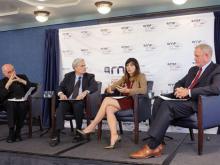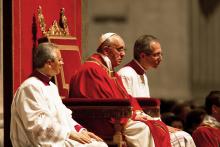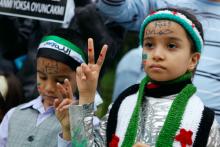Just War Theory

In April 2016, Roman Catholics from around the world gathered at the Vatican to discuss how the church might embrace the principles of nonviolence and just peace more deeply (see "Game Changer?" in the December 2016 issue of Sojourners.)
And what does "just peace" include? Here are seven key principles:
Just cause: protecting, defending, and restoring the fundamental dignity of all human life and the common good
Right intention: aiming to create a positive peace
Participatory process: respecting human dignity by including societal stakeholders—state and nonstate actors as well as previous parties to the conflict
Right relationship: creating or restoring just social relationships both vertically and horizontally; strategic systemic change requires that horizontal and vertical relationships move in tandem on an equal basis
Reconciliation: a concept of justice that envisions a holistic healing of the wounds of war
Restoration: repair of the material, psychological, and spiritual human infrastructure
Sustainability: developing structures that can help peace endure over time
Adapted from “What Kind of Peace Do We Seek?” by Maryann Cusimano Love, associate professor of international relations at the Catholic University of America, in Peacebuilding (Orbis Books, 2010).

America as a largely Christian nation is under scrutiny for its values and integrity. It’s an interesting time to be a person committed to faith in action. How does Christian faith inspire a response to these chaotic times?

Just war theory can be adapted to address technological innovation, said Rev. Bryan Hehir at a panel in D.C. Monday.

The two major streams of Christian engagement on war are pacifism and just war theory, which comes out of Catholic social teaching. The pacifist response to Syria strikes is clearly opposed. As for the just war analysis, it takes a little explaining, but reaches the same conclusion.

For over 1,500 years, the Catholic Church has promoted “just war theory” as a way to determine in what cases a war can be considered morally justifiable. But all of that may change.
In an interview, Cardinal Peter Turkson of Ghana said that it is “plausible” that Pope Francis may write a new encyclical updating Catholic teaching on war and peace, an update that could include a retreat from just war theory. Francis’ last encyclical, “Laudato Si,” made waves for its condemnation of capitalism and call to address climate change.

What good would it do for three kayaks, three canoes, and a rubber dinghy to paddle into the path of a Pakistani steamship? For a tiny fishing boat with unarmed, praying Americans aboard to sail toward an American battleship threatening Nicaragua? For an 80-year-old lady in a wheelchair to stop in front of advancing Filipino tanks? Or for nonviolent protesters to defy the communist rulers of the Soviet Empire?
Soviet communism collapsed. The tanks stopped and a nonviolent revolution succeeded. The American battleship left and the threat of invasion faded. And the U.S. shipment of arms to Pakistan stopped.
Those are just a few of the many dramatic successes of nonviolent confrontation in the last several decades. Everyone, of course, knows how Mahatma Gandhi’s nonviolent revolution eventually defeated the British Empire and – as the powerful film Selma now reminds us – Martin Luther King Jr.’s peaceful civil rights crusade changed American history. There have been scores upon scores of instances of nonviolent victories over dictatorship and oppression in the last 50-plus years. In fact, Dr. Gene Sharp, the foremost scholar of nonviolence today, has said that the later 20th century saw a remarkable expansion of the substitution of nonviolent struggle for violence. More recent scholarship has not only confirmed Sharp’s comment; it has also shown that nonviolent revolutions against injustice and dictatorship are actually more successful than violent campaigns.

Alarm and outrage has been growing over the mounting humanitarian crisis in Iraq at the hands of the Islamic State (IS) also known as ISIL (Islamic State of Syria and the Levant) or ISIS (Islamic State of Iraq and Syria).
Christians in the region are being forced to convert, pay tribute or die as the al Qaeda breakaway group sweeps into predominantly Christian villages and Hamlets in Iraq, sending tens of thousands fleeing for their lives. Other non-Muslim groups, in particular the Yazidi, who practice a faith that predates Islam, are reportedly considered as infidels by the fanatic Islamic State and targeted for extermination in what many are calling a genocide. The U.N. is still gathering numbers but it believes that hundreds of Yazidis have been killed while others, primarily women, have been abducted and taken into slavery. Around 40,000 Yazidis have fled into the mountains of Northwest Iraq where they face the prospect of starvation on mountain or massacre by the Islamic State militants below.
The news is devastating and overwhelming. The suffering and acts of brutal violence staggers the imagination. What would a nonviolent response look like?

Even as the world’s powers grasped for a last-minute resolution to the crisis in Syria, it remained an open question whether any amount of diplomacy could prevent the conflict from claiming at least one more victim: the classic Christian teaching known as the “just war” tradition.
The central problem is not that the just war doctrine is being dismissed or condemned, but that it is loved too much. Indeed, both sides in the debate over punishing the Syrian regime for using chemical weapons are citing just war theory, but are reaching diametrically opposed conclusions.

As the Obama administration readies for a probable military strike against Syria, Religion News Service asked a panel of theologians and policy experts whether the U.S. should intervene in Syria in light of the regime’s use of chemical weapons against civilians. Would the “Just War” doctrine justify U.S. military action, and what is America’s moral responsibility? Here are their responses, which have been edited for clarity.

Christian ethicist Jean Bethke Elshtain, a scholar who shaped national conversations on war and peace from her perch at the University of Chicago, died Sunday at age 72.
She had two heart attacks in 2012 and, according to the school, she had another “cardiac incident” earlier this summer that led to her death.
The widely admired political philosopher regularly wrote and lectured on ethics, politics, and religion. She defended American military intervention in Iraq and Afghanistan using “just war theory,” a position that suggests there are times when it is necessary and perhaps right to go to war.
When a hundred scholars and ethicists signed a petition that read, “As Christian ethicists, we share a common moral presumption against a preemptive war on Iraq by the United States,” Elshtain argued the opposite, publishing the book Just War Against Terror in 2003.

Dear Liberty University,
I want to write truthfully about God. I know many will find that an odd way to begin a letter about U.S. drone warfare, but I see no other way. This morning, I was discouraged to read that Liberty University has been training Christians to pilot armed U.S. drones since 2011 in your School of Aeronautics (SOA). The reasons for my discouragement are many — not least of which is the idea that Liberty graduates can somehow "serve the Lord" by targeting and killing their neighbors. Here, I would like to outline some of my concerns in detail with the hope that Liberty might reconsider, or at least restate theologically, its position regarding U.S. drone warfare.
David Cortright's "Finding the Way Out" (March 2011), about why it's time to end the war in Afghanistan, was excellent and timely with one exception -- his appeal to the just war doctrine.
[Editors' note: This post was written in response to a question posed by The Washington Post's On Faith blog editors: Is it moral to celebrate a person's death, even i
